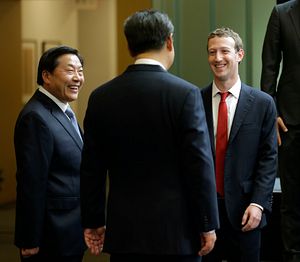Lu Wei, China’s former internet czar and in 2015 among the world’s 100 most influential people according to Time magazine, is under investigation.
Late on November 21, the Central Commission for Discipline Inspection (CCDI) — China’s top anti-corruption agency and the highest internal-control institution of the Chinese Communist Party (CCP) — announced on its website that Lu is under investigation by the agency because he is suspected of “serious violations of discipline.” In China’s political dictionary, “serious violations of discipline” means that Lu’s case definitely involves corruption.
Meanwhile, CCDI also published a special commentary on Lu’s fall under the title of “Anti-corruption struggles will never stop.” The commentary referred to Lu as the “first fallen tiger” after the recently-closed 19th National Congress of the CCP.
The commentary said that the investigation on Lu has showed “the firm resolution on corruption of the CCP’s Central Committee with Comrade Xi Jinping as the core” and has sent “a strong signal that the Party will never be lenient on its members.”
In the end, the commentary sent a warning to CCP members:
The harsh and complicated situation of anti-corruption campaign has not changed [after the 19th Party Congress]. The determination of the Central Committee to win an overwhelming victory is as solid as rock… [The Party will] continue its efforts to build a clean government. The struggle against corruption will not stop for a single moment.
Both the CCDI’s announcement and the commentary demonstrated that Lu’s political career has come to an absolute end.
Lu, 57, began his career as a reporter; in 1991, he worked for Xinhua, China’s state news agency, where he was gradually promoted to the agency’s senior leader. In 2011, he was elevated to the position of vice mayor of Beijing City, in charge of the propaganda department.
In 2014, Lu’s career took off. That year China established the Office of the Central Leading Group for Cyberspace Affairs, or the Cyberspace Administration of China (CAC). Lu was appointed as the director of the office.
The CAC functions both as a government organ and a Party organ, which makes extremely powerful over China’s internet industry. Since then, Lu was called China’s internet czar.
During his time in office, Lu was “uncharacteristically outspoken,” especially to the international community, as Jon Huntsman — a former U.S. ambassador to China — noted. Lu was very straightforward in defending the legitimacy of the government’s clampdown on the internet and he never hesitated to defend China’s need for stronger internet controls.
For example, regarding Facebook’s failing to get access to China’s market, Lu once famously said: “I didn’t say Facebook could not enter China, but nor did I say that it could… Foreign Internet companies can come to China if they abide by the law. We could not allow any companies to enter China’s market and make money while hurting the country.” In order to charm Lu, Facebook founder Mark Zuckerberg reportedly told Lu that he had encouraged all his employees to read Xi Jinping’s books during Lu’s visit to Facebook’s Silicon Valley offices in late 2014.
However, in 2016, Lu was removed from his position as director of the internet office, although he still retained his position as vice minister of the CCP’s propaganda department. Since then, there have been widespread rumors that the CCDI received internal reports on Lu’s misconduct. The investigation announcement would seem to confirm those rumors.

































